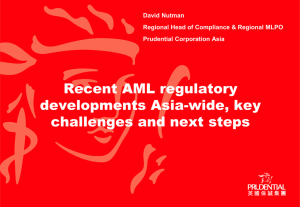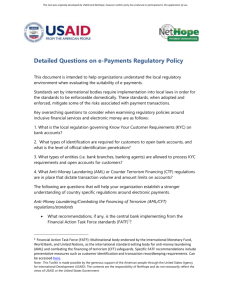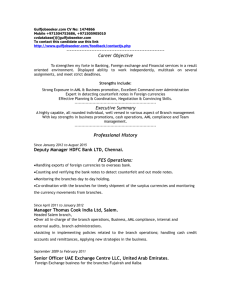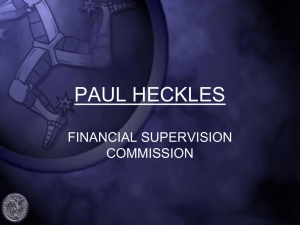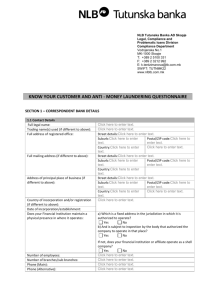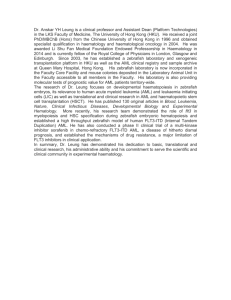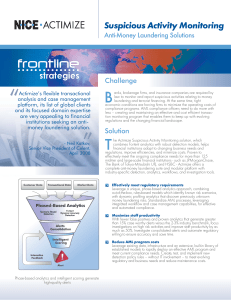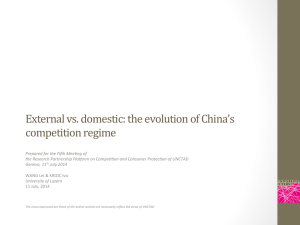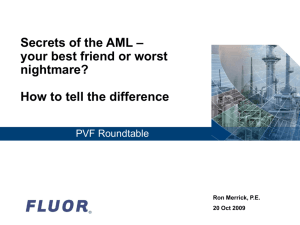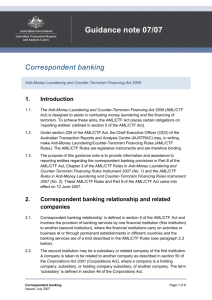Meezan Bank AML/KYC Questionnaire for Correspondent Banks
advertisement
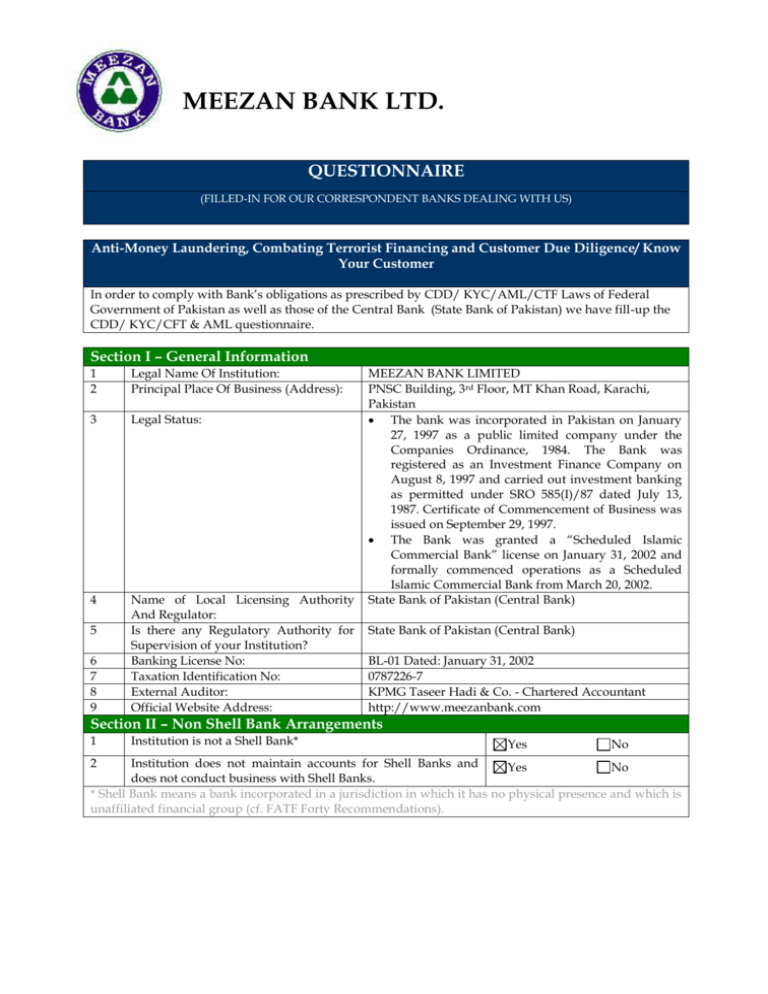
MEEZAN BANK LTD. QUESTIONNAIRE (FILLED-IN FOR OUR CORRESPONDENT BANKS DEALING WITH US) Anti-Money Laundering, Combating Terrorist Financing and Customer Due Diligence/ Know Your Customer In order to comply with Bank’s obligations as prescribed by CDD/ KYC/AML/CTF Laws of Federal Government of Pakistan as well as those of the Central Bank (State Bank of Pakistan) we have fill-up the CDD/ KYC/CFT & AML questionnaire. Section I – General Information 1 2 Legal Name Of Institution: Principal Place Of Business (Address): 3 Legal Status: 4 Name of Local Licensing Authority And Regulator: Is there any Regulatory Authority for Supervision of your Institution? Banking License No: Taxation Identification No: External Auditor: Official Website Address: 5 6 7 8 9 MEEZAN BANK LIMITED PNSC Building, 3rd Floor, MT Khan Road, Karachi, Pakistan The bank was incorporated in Pakistan on January 27, 1997 as a public limited company under the Companies Ordinance, 1984. The Bank was registered as an Investment Finance Company on August 8, 1997 and carried out investment banking as permitted under SRO 585(I)/87 dated July 13, 1987. Certificate of Commencement of Business was issued on September 29, 1997. The Bank was granted a “Scheduled Islamic Commercial Bank” license on January 31, 2002 and formally commenced operations as a Scheduled Islamic Commercial Bank from March 20, 2002. State Bank of Pakistan (Central Bank) State Bank of Pakistan (Central Bank) BL-01 Dated: January 31, 2002 0787226-7 KPMG Taseer Hadi & Co. - Chartered Accountant http://www.meezanbank.com Section II – Non Shell Bank Arrangements 1 2 Institution is not a Shell Bank* Yes No Institution does not maintain accounts for Shell Banks and Yes No does not conduct business with Shell Banks. * Shell Bank means a bank incorporated in a jurisdiction in which it has no physical presence and which is unaffiliated financial group (cf. FATF Forty Recommendations). Section III – Ownership and Management Information 1 Please indicate Stock Exchange Name(s) & Symbol(s) on which shares are traded: The shares of Meezan Bank are listed on Karachi Stock Exchange (KSE). The symbol code is ‘MEBL’. 2 Major Shareholding (5% and above) Names of all owners** and their ownership interest: Name and Domicile Ownership interest Nature of ownership (%) (direct/indirect) Noor Financial Investment Co, Kuwait 49.11% Direct Pakistan Kuwait Investment Co. (Pvt.) 30% Direct Ltd. Islamic Development Bank, Jeddah 9.32% Direct ** An “owner” is any person or legal entity that; directly or indirectly; owns or control any class of securities or other voting interests in the Institution. 3 Have there been any significant changes in ownership over Yes No the last five years? If yes, please provide details: Noor Financial Investment Company, Kuwait has acquired the entire 49.11% shareholding of the Bank during the period of last five years. 4 Are there any Politically Exposed Persons*** among your Yes No Institution’s ownership structure and executive management? If yes, please provide details (name and role): H.E. Sheikh Ebrahim Bin Khalifa Al-Khalifa, Minister For Housing, Ministry of Housing, Kingdom of Bahrain. *** Politically Exposed Persons (PEPs) are individuals who are or have been entrusted with prominent public function, for example Heads of State or of government, senior politicians, senior government, judicial or military officials, senior executives of state owned corporations, important political party officials, or their family members or close associates. The definition is not intended to cover middle ranking or more junior individuals in the foregoing categories (cf. FATF Forty Recommendations). Section IV – Business Activity 1 Please provide the principal types of Business Activity a) Islamic Commercial Banking b) Corporate c) Commercial/SME d) Consumer Banking e) Investment Banking f) Retail Banking g) On Line Banking & Trade Services Anti-Money Laundering Questionnaire Section I - General AML Policies, Practices and Procedures: 1 2 Does the AML compliance program require approval of the FI’s Board or a senior committee thereof? Does the FI have a legal and regulatory compliance program that includes a designated Compliance officer that is responsible for coordinating and overseeing the AML program on a day-to-day basis, which has been approved by senior management of the FI? Yes No Yes No 3 4 5 6 7 8 9 Has the FI developed written policies documenting the processes that they have in place to prevent, detect and report suspicious transactions that has been approved by senior management? In addition to inspections by the government supervisors/regulators, does the FI Customer have an internal audit function or other independent third party that assesses AML policies and practices on a regular basis? Does the FI have policies covering relationships with PEPs consistent with industry best practices? Does the FI have appropriate record retention procedures pursuant to applicable law? Does the FI require that its AML policies and practices be applied to all branches and subsidiaries of the FI both in the home country and in locations outside of the home country? Does your institution provide training to employees regarding KYC/AML/CTF? Is the FI fully compliant with the FATF 49 recommendations? Yes No Yes No Yes No Yes No Yes No Yes No Yes No Yes No Yes No Section II – Risk Assessment 10 11 Does the FI have a risk focused assessment of its customer base and transactions of its customers? Does the FI determine the appropriate level of enhanced due diligence necessary for those categories of customers and transactions that the FI has reason to believe pose a heightened risk of illicit activities at or through the FI? Section III - Know Your Customer, Due Diligence and Enhanced Due Diligence 12 13 14 15 16 Has the FI implemented systems for the identification of its customers, including customer information in the case of recorded transactions, account opening, etc. (for example; name, nationality, street address, telephone number, occupation, age/date of birth, number and type of valid official identification, as well as the name of the country/state that issued it)? Does the FI have a requirement to collect information regarding its customers’ business activities? Does the FI collect information and assess its FI customers’ AML policies or practices? Does the FI have procedures to establish a record for each customer noting their respective identification documents and Know Your Customer Information collected at account opening? Does the FI take steps to understand the normal and expected transactions of its customers based on its risk assessment of its customers? Yes No Yes No Yes No Yes No Yes No Section IV - Reportable Transactions and Prevention & Detection of Transactions with Illegally Obtained Funds 17 18 Does the FI have policies or practices for the identification and reporting of transactions that are required to be reported to the authorities? Does the FI have policies or practices to identify transactions structured to avoid large cash reporting requirements? Yes No Yes No 19 20 Does the FI have policies to reasonably ensure that they will not conduct transactions with or on behalf of shell banks through any of its accounts or products? Does the FI have policies to reasonably ensure that it only operates with correspondent banks that properly licensed? Yes No Yes No Yes No Yes No Yes No Yes No Yes No Section V - Transaction Monitoring 21 Does the FI have a monitoring program for suspicious or unusual activity that covers funds transfers and monetary instruments (such as travellers checks, money orders, etc.)? Section VI - AML Training 22 23 24 25 Does the FI provide AML training to relevant employees that includes identification and reporting of transactions that must be reported to government authorities, examples of different forms of money laundering involving the FI’s products and services and internal policies to prevent money laundering? Does the FI retain records of its training sessions including attendance records and relevant training materials used? Does the FI have policies to communicate new AML related laws or changes to existing AML related policies or practices to relevant employees? Does the FI employ agents to carry out some of the functions of the FI and if so does the FI provide AML training to relevant agents that includes identification and reporting of transactions that must be reported to government authorities, examples of different forms of money laundering involving the FI’s products and services and internal policies to prevent money laundering? I hereby confirm that the statements given above are true and correct. I also confirm that I am authorized to complete this document. Saleem Wafai Signature of Head of Compliance of Meezan Bank Limited Date: Official Contact Address: Telephone No(s): E-mail Address: January, 2010 3rd Floor, PNSC Building, MT Khan Road, Karachi, Pakistan 0092 - 21 35611261 saleem.wafai@meezanbank.com Please send queries to: saleem.wafai@meezanbank.com (OR) via fax number: (0092-21) (35611946) (OR) via courier to the following postal address: Compliance Department Meezan Bank Limited Head Office, PNSC Building, 3rd Floor, MT Khan Road, Karachi, Pakistan
